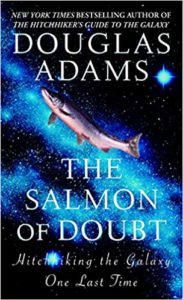3 Tips for Overcoming Objections to Using Mentoring Software
 From medical technology to online banking tools, from smart phones and the copious number of apps available to streaming services and the internet in general, technological advancements have many impacts on our lives. It’s with this reality as background that I share this quote from author Douglas Adams taken from his book The Salmon of Doubt.
From medical technology to online banking tools, from smart phones and the copious number of apps available to streaming services and the internet in general, technological advancements have many impacts on our lives. It’s with this reality as background that I share this quote from author Douglas Adams taken from his book The Salmon of Doubt.
“I’ve come up with a set of rules that describe our reactions to technologies:
1. Anything that is in the world when you’re born is normal and ordinary and is just a natural part of the way the world works.2. Anything that’s invented between when you’re fifteen and thirty-five is new and exciting and revolutionary and you can probably get a career in it.
3. Anything invented after you’re thirty-five is against the natural order of things.”
This can feel so true. We talk about Millennials and Gen Z as Digital Natives who just naturally understand tech and adeptly use new technology with ease. And then there’s the rest of us who are older and who fall into that over thirty-five category Douglas Adams describes, where technological advancements can feel foreign.
While I think this quote is true to some extent, it is also important to note that there are new technologies that we learn and that become a part of our daily lives even as we age. For example, marketing automation software did not exist when I was starting my career, but it is an integral part of my daily routine now.
For people in the workplace, utilizing a new technology can come with some growing pains. We’ve certainly had conversations with people who were interested in using our mentoring software, but who were worried they would not be able to convince older workers—whom they planned to ask to be mentors—to sign up and use software for mentoring.
So how do you overcome objections to using software for something like mentoring that is intrinsically a personal and relationally driven process? Here are a few ideas we share with our clients.
 1. Identify Objections
1. Identify Objections
Why is someone hesitant to use mentoring software? Do they not want to use a new technology because they are already in a mentoring relationship and don’t feel technology will benefit them? Do they have some misunderstanding about what to expect with the technology? Do they assume it will disrupt their process or be difficult to use?
All of these are reasons why someone may be hesitant to use mentoring software. It is critical that you open a dialogue with people about any objections they have for using new technology so that you can work to address and hopefully overcome those objections.
2. Provide Information to Calm Fears
Sometimes fear of the unknown is the biggest hurdle to someone using a new technology. You can address this by giving people as much information as they need so that they can begin to understand the positive aspects of the technology and how it will help them be more effective or efficient in their mentoring relationships.
 To this end, you can stress that River mentoring software is designed to reduce administrative burdens in terms of running a mentoring program and to make it easier for mentees and mentors to participate in mentoring. Providing this information to your team and potential mentees and mentors can help assuage fears of a new technology. Here are some of the key points you can share about River.
To this end, you can stress that River mentoring software is designed to reduce administrative burdens in terms of running a mentoring program and to make it easier for mentees and mentors to participate in mentoring. Providing this information to your team and potential mentees and mentors can help assuage fears of a new technology. Here are some of the key points you can share about River.
- River helps organizations match mentees and mentors via our intelligent matching algorithm, which is a welcome change for people used to making matches via a time-consuming search using a massive spreadsheet.
- Organizations can configure River’s matching algorithm to suit their unique program needs, such as around competencies, job level, and demographic details. This helps make quality matches based on factors that matter to you and your program.
- Mentoring relationships can be measured in River via our integrated and highly-configurable surveys. These surveys provide a way for mentees and mentors to check in throughout the life of their relationship to monitor the progress they are making toward their goals and help keep them on track. The surveys can be configured differently for each program an organization runs, which gives administrators flexibility to measure what is important to their program, while also giving organizations a way to ensure people are actively engaging with their mentees and mentors in general.
- River supports one-to-one traditional mentoring, group mentoring, reverse mentoring, peer mentoring, and much more. Your program can be configured to the design model that meets your needs and that your mentees and mentors are looking for.
- Reports in River can provide insights into relationship progress, mentoring success, participant satisfaction, competency gaps, and more. Metrics and measurements via River can showcase how mentoring is having an impact on the organization and the individual employees participating in the program.
3. Provide Supporting Research and Stats
There are many statistics available that show the value mentoring can bring to people. River has even published an eBook on the ROI of Mentoring that highlights some of our own research with our clients. In addition to this source of information, here are some stats that you can share within your origination about mentoring and related topics.
Millennials
The 2016 Deloitte Millennial Study found that 61% of Millennials are currently benefiting from having somebody to turn to for advice, or who helps develop their leadership skills—aka a mentor. Of those Millennials with a mentor:
- 94% said their mentor provides good advice
- 91% said their mentor is interested in their personal development
- 83% said they are satisfied with mentoring
 Leadership
Leadership
It’s not just Millennials who can benefit from mentoring; mentoring can add value to anyone’s career and life, regardless of their age and job title. In DDI’s Global Leadership Forecast 2018 report, author Stephanie Neal looks at how mentoring can impact leadership development. The report shows data from DDI researchers on the benefits of having a formal mentoring program, such as:
- 23% more critical roles can be filled immediately
- 46% higher leader quality overall
- 20% lower turnover
- 7x more capable of capturing organizational knowledge before it’s lost
Brain Drain, Gender Equality, and Generational Differences
The team at River has seen mentoring benefit younger employees, high potential development, and leadership development in our work with our clients. We’ve also written about how mentoring can help stop brain drain, how mentoring can play a key role in leadership development, especially for women, and how mentoring appeals to all generations. You can use these resources and facts to support your argument for why mentoring software is a technological advancement that can support anyone interested in mentoring.
Ultimately, software of any sort should make your job and tasks easier, and River is an award-winning mentoring software that does just that. Contact us to learn more and to discuss how River can help you do more with mentoring.








